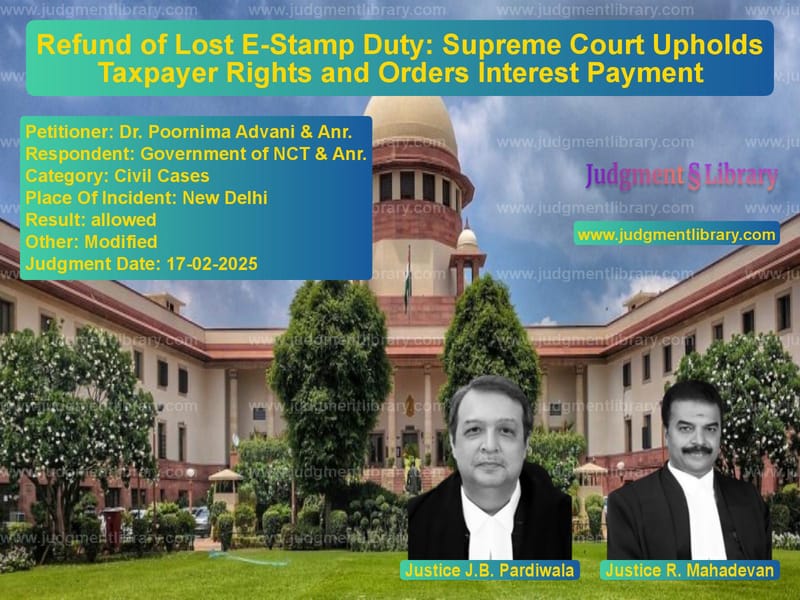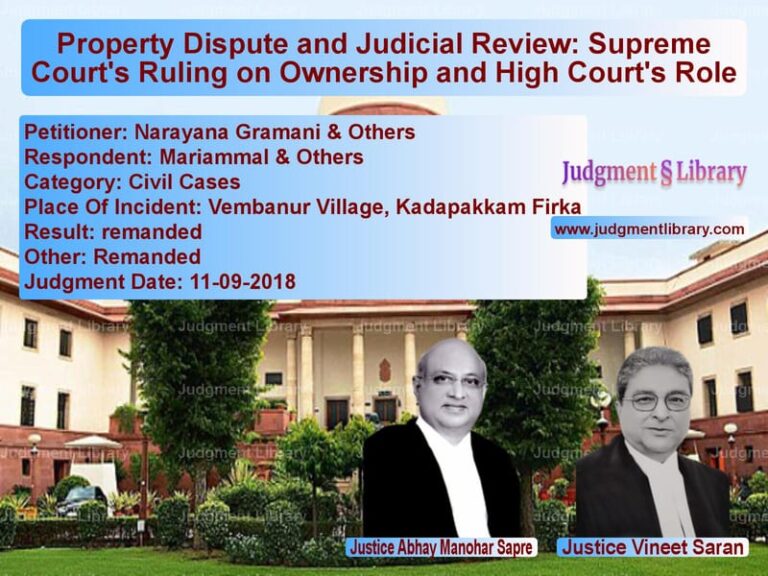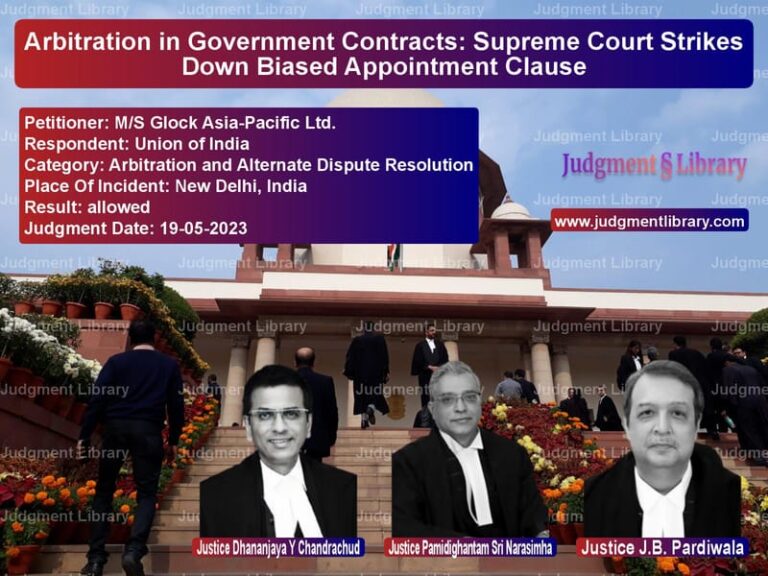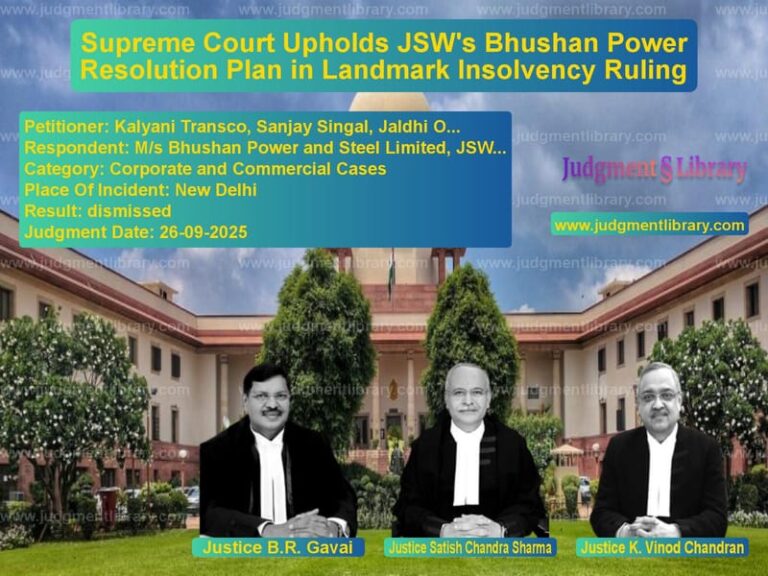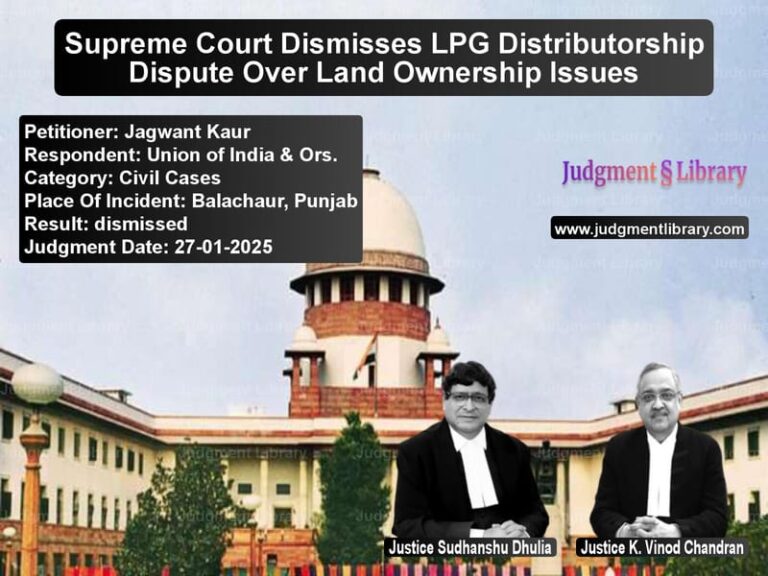Refund of Lost E-Stamp Duty: Supreme Court Upholds Taxpayer Rights and Orders Interest Payment
The case of Dr. Poornima Advani & Anr. vs. Government of NCT & Anr. is a significant ruling by the Supreme Court of India concerning the refund of lost e-stamp duty. The Court not only upheld the petitioners’ right to a refund but also directed the government to pay interest on the amount, setting a precedent for cases involving the loss of stamp duty.
The dispute arose when the petitioners lost an e-stamp paper purchased for executing a property sale deed. Despite filing a timely application for a refund, the authorities refused, citing the absence of explicit provisions for such cases. The Supreme Court overruled the decisions of the lower courts and reinforced that retention of money without a valid legal basis violates Article 265 of the Constitution of India.
Background of the Case
The petitioners, Dr. Poornima Advani and her husband, intended to purchase a property in New Delhi. On July 6, 2016, they bought an e-stamp paper valued at Rs. 28,10,000/- to execute the sale deed. However, due to a delay in the loan processing, the sale was postponed.
Unfortunately, on August 4, 2016, the broker handling the e-stamp paper informed the petitioners that it had been misplaced. The petitioners:
- Filed a police complaint regarding the loss.
- Published a notice in newspapers about the missing e-stamp paper.
- Purchased a new e-stamp paper on August 6, 2016 and executed the sale deed.
On August 11, 2016, the petitioners formally applied to the Sub-Divisional Magistrate (Collector of Stamps) for a refund of the lost e-stamp duty. Despite providing an affidavit and an indemnity bond, the authorities rejected the refund application on October 21, 2018. The petitioners then approached the Delhi High Court.
Delhi High Court’s Ruling
The case was first heard by a single-judge bench of the Delhi High Court, which:
- Recognized the petitioners’ right to a refund.
- Ordered the government to refund Rs. 28,10,000/-.
- Denied the petitioners’ request for interest on the refund.
The petitioners appealed, seeking interest on the refunded amount. However, the division bench dismissed the appeal, stating that the interest claim was not raised before the single-judge bench.
Arguments Before the Supreme Court
Petitioners’ Arguments
The petitioners’ counsel, Mr. Abhishek Puri, argued:
- The state cannot retain money without legal authority, as per Article 265 of the Constitution.
- Interest is a fundamental right when a person is deprived of their money for an extended period.
- Courts have consistently ruled that compensation must be paid for delays in refunds.
- The state’s refusal to pay interest amounts to unjust enrichment.
Respondents’ Arguments
The government’s counsel, Ms. Jyoti Mehandiratta, contended:
- There is no statutory provision mandating interest on stamp duty refunds.
- The petitioners did not raise the issue of interest before the High Court’s single-judge bench.
- Allowing such claims could open floodgates for similar demands.
Supreme Court’s Observations
The Supreme Court rejected the government’s arguments and made the following key observations:
“No tax shall be levied or collected except by the authority of law. The continued retention of the amount paid towards stamp duty, when the taxing event has not occurred, is illegal.”
The Court emphasized that:
- Refunding the principal amount alone is not sufficient; compensation must be paid for the delay.
- Interest is an integral part of the refund process to prevent the state from benefiting at the taxpayer’s expense.
- Judicial precedent supports the grant of interest in cases where an individual is deprived of their money due to administrative delays.
Final Judgment
The Supreme Court ruled:
“The respondents are directed to pay an amount of Rs. 4,35,968/- (Four Lakh Thirty-Five Thousand Nine Hundred Sixty-Eight Only) towards interest within a period of two months from today without fail.”
The breakup of the awarded interest:
| Period | Amount | Interest Rate | Interest Amount |
|---|---|---|---|
| 20-08-2018 to 29-02-2020 | Rs. 28,10,000/- | 8% p.a. | Rs. 3,43,666/- |
| 01-03-2020 to 08-03-2024 | Rs. 2,81,000/- | 8% p.a. | Rs. 90,535/- |
| 09-03-2024 to 09-08-2024 | Rs. 2,81,000/- | 1.5% p.a. | Rs. 1,766/- |
| Total Interest | Rs. 4,35,968/- | ||
Key Takeaways
- State Cannot Retain Money Without Legal Authority: Retaining money after the taxing event has not occurred is unconstitutional.
- Interest is a Right, Not a Favor: Courts have upheld the principle that compensation must be paid for delays in refunds.
- Doctrine of Restitution: A person deprived of their money due to administrative delays is entitled to interest.
- Impact on Future Cases: This judgment sets a precedent for similar stamp duty refund disputes.
Conclusion
The Supreme Court’s ruling in this case reinforces taxpayer rights and ensures that government authorities cannot withhold refunds without consequences. This decision is a step forward in making administrative systems more accountable and fair to the public.
Petitioner Name: Dr. Poornima Advani & Anr..Respondent Name: Government of NCT & Anr..Judgment By: Justice J.B. Pardiwala, Justice R. Mahadevan.Place Of Incident: New Delhi.Judgment Date: 17-02-2025.
Don’t miss out on the full details! Download the complete judgment in PDF format below and gain valuable insights instantly!
Download Judgment: dr.-poornima-advani-vs-government-of-nct-&-supreme-court-of-india-judgment-dated-17-02-2025.pdf
Directly Download Judgment: Directly download this Judgment
See all petitions in Property Disputes
See all petitions in Damages and Compensation
See all petitions in Legal Malpractice
See all petitions in Judgment by J.B. Pardiwala
See all petitions in Judgment by R. Mahadevan
See all petitions in allowed
See all petitions in Modified
See all petitions in supreme court of India judgments February 2025
See all petitions in 2025 judgments
See all posts in Civil Cases Category
See all allowed petitions in Civil Cases Category
See all Dismissed petitions in Civil Cases Category
See all partially allowed petitions in Civil Cases Category

